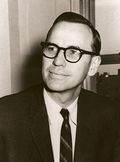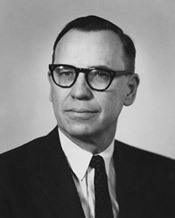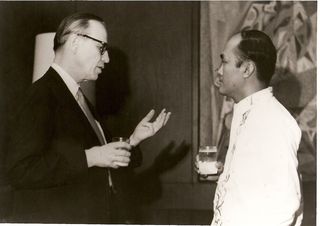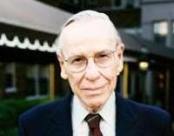Posted by Michel Lazare
It is with deep sadness that PFM Blog announces the passing of Richard Goode on July 18, 2010. Richard Goode was a distinguished economist, whose writings on tax issues and fiscal policy in developing countries have had a long-lasting influence.
Richard Goode was the First Director of the IMF's Fiscal Affairs Department (FAD), which he headed from 1965 until his retirement in 1981. He largely contributed to making FAD, what it is today: a leading source of expertise on fiscal policy and fiscal institutions.
Most of all, Richard Goode is still remembered in FAD for his immense human qualities.
We are publishing below a copy of the e-mail that Professor Stephen Gardner circulated earlier this week about the life and accomplishments of Richard Goode, as well as reflections from John Lipsky (the IMF's First Deputy Managing Director), Jim Boughton (the former IMF historian), and Vito Tanzi (former FAD's Director) on the life and contributions of Richard Goode.
Professor Stephen Gardner also conducted a long oral history interview of Richard Goode in 1998. His transcript can be found in clicking on the following link: http://bearspace.baylor.edu/Steve_Gardner/web/Goode_Interview_1998.pdf
From Professor Stephen H Gardner:
Dear Friends and Colleagues,
 If you have not already heard, some of you may wish to know that Dr. Richard Goode passed away on Sunday at his home in Washington, D.C. Born in Fort Worth, Texas, in 1916, Richard would have been 94 years old on July 31.
If you have not already heard, some of you may wish to know that Dr. Richard Goode passed away on Sunday at his home in Washington, D.C. Born in Fort Worth, Texas, in 1916, Richard would have been 94 years old on July 31.
Richard entered Baylor University in 1933, and completed an undergraduate degree in economics in 1937. Aldon Lang, who later became dean of our business school, was his first academic mentor.
After Baylor, Richard completed a masters degree at U. Kentucky in 1939, where he studied with James W. Martin, Edgar Palmer, Oscar Morgenstern and others. Then he entered the PhD program at U Wisconsin, where he studied public finance with Harold Groves, and was a classmate of Walter Heller and Joe Pechman. While he was working on his PhD, he also spent much of his time in Washington, D.C., working with Gardiner Means at the Bureau of the Budget. In 1947, he finished his PhD and joined the faculty of U. Chicago, where he worked with Roy Blough as associate editor of the new National Tax Journal, and also worked with Schultz (who was chairman), Arrow, Domar, Friedman, Koopmans, Marschak, Gale Johnson, and others.
Richard left Chicago in 1951 to work in the Research Department of the relatively new International Monetary Fund, working for Sidney Alexander.
Between 1959 and 1965, Richard worked with Joe Pechman and others at Brookings, and published his well-known book, The Individual Income Tax, in 1964.
In 1965, Richard returned to the IMF as the first director of the Fiscal Affairs Department, and continued in that position until his compulsory retirement in 1981.
During the mid-1980s, Richard spent a few additional years as a guest scholar Brookings, where he published Government Finance in Developing Countries (which is still used as a text at some universities) in 1984 and Economic Assistance to Developing Countries through the IMF in 1985, and he also taught occasional courses at SAIS. He was an active member of the Cosmos Club.
In 1998, I visited Richard’s home and recorded and edited an oral history with him that runs 69 pages. If any of you would like to have an electronic copy, I’ll be happy to send it to you. Since then, I’ve spoken to him occasionally by phone. He was a brilliant, witty, and charming guy. In recent years, Richard was in very poor health, had no kids, and had outlived his wife, Liesel, and many of his closest friends, so it was time to go – but I’ll still miss him very much.
I understand that an obituary will appear soon in the The Washington Post. I also understand that there will be no immediate funeral service, but possibly a memorial service at a later date.
All the best,
Steve Gardner
Herman Brown Professor of Economics
Chairman, Department of Economics
Director, McBride Center for International Business
Baylor University
***
By First Deputy Managing Director John Lipsky
I was saddened to learn that Richard Goode—the first Director of the Fiscal Affairs Department—passed away last July 18 here in Washington. Together with such towering figures as Sir Joseph Gold, Marcus Fleming and Jacques Polak, Richard Goode was one of the most notable staff members from the Fund’s early years. While the Fund today is viewed generally as a very well-established institution, Richard Goode and his pioneering colleagues were responsible for first translating the abstract intentions of the Fund’s political creators into operational policies, practices, and analytical techniques.
In particular, we take it for granted today that the Fund is recognized around the world as a leading source of expertise on fiscal policy issues. In fact, this is in no small measure a reflection of Richard Goode’s analytical excellence and his exemplary personal qualities. As Jim Boughton explains in his accompanying note, Mr. Goode already was a widely recognized fiscal expert when he rejoined the Fund from the Brookings Institution in 1965 to head the newly formed FAD. But the Fund had no prior reputation in this area.
Richard Goode, first Director of the Fiscal Affairs Department

As FAD’s first Director, Richard Goode assembled a first-rate team of experts, including Vito Tanzi, who became his successor. As an innovating researcher, he made many important contributions to the development of international tax policies. Some of his publications—such as Government Finance in Developing Countries—have had a long-lasting influence among leading scholars, policy experts and policymakers.
I had the honor of serving my first YP (EP today) assignment in FAD, and I still can recall vividly my first visit to Richard Goode’s office for a brief welcoming interview. Fund staff colleagues knew Richard Goode as a brilliant, but modest, unassuming—and even courtly—gentleman. He maintained the very highest professional standards, but he never seemed interested in bolstering his own reputation.
Richard Goode’s combination of first-rank scholarship, expertise on operational fiscal issues, and understated manner earned him the deep respect of his colleagues.
That the passing of Richard Goode has taken place so close to the loss of Jacques Polak underscores their absence, but also leads us to appreciate their remarkable careers and their long and productive lives. The current crisis called for creativity and leadership from our institution, including in helping Fund member countries face fiscal policy challenges. We all can find inspiration in Richard Goode’s example of excellence and intellectual innovation.
***
From a historian’s perspective
By Jim Boughton
Richard Goode was a remarkable man, an important force in the history of this institution.
Richard Goode joined the staff in 1951, when the Fund was still a little-known agency of secondary importance in the world economy. All of the analytical and policy work was being done in one department—Research and Statistics—which was where this former faculty member of the University of Chicago had his office. After eight years, he left the Fund to work with Joseph Pechman and other leading tax experts at the Brookings Institution. By the mid-1960s, he was ranked highly among those experts, especially after the publication of his long-indispensable book on U.S. policy, The Individual Income Tax.
Through the Fund’s first two decades, fiscal policy was not a major focus of our analysis. Exchange rate issues and monetary policy were our bread and butter. The original "Polak model" did not distinguish between monetary and fiscal policy as influences on the balance of payments. Not until the Fleming-Mundell model emerged in the early 1960s was it possible to identify clearly the independent international role of fiscal policies. In the meantime, the Economic and Social Department of the United Nations was the main source of technical assistance to developing countries in that field. When Marcus Fleming and Robert Mundell wrote their seminal papers at the Fund and Jacques Polak expanded his model to show fiscal effects separately, it was time for the Fund to take a more central role.
In April 1964, the Executive Board established the Fiscal Affairs Department as a way to promote, refine, and consolidate the Fund’s growing responsibilities in fiscal policy assistance and advice. Management then set out to find a leading expert to direct the new department. Re-enter Richard Goode, who left Brookings to become the first director of FAD in 1965. Over the next 16 years, until he reached mandatory retirement age, Goode built the department into a leading source of research on fiscal policy and of technical assistance on tax administration, public expenditure policy, debt management, and other fiscal issues. He had a profound impact on his staff and colleagues, as the testimonies by John Lipsky and Vito Tanzi aptly illustrate.
***
From a friend and successor
By Vito Tanzi
Richard Goode died recently at the age of 94. He had lived almost 30 years after his retirement from the IMF in the summer of 1981. He had been the first Director of the Fiscal Affairs Department (FAD) of the IMF and my boss for 16 years. I recall well the morning of December 18, 1973 when I got a call from him while I was visiting at the George Washington University Hospital where my third son was born the night before. He asked me whether I would be interested in replacing Richard Bird, a Canadian public finance expert who had been running the Tax Policy Division in FAD, and had decided to return to Canada. After some thought, I accepted the offer and later resigned from my academic post. So, because of that call, the rest of my life would be different.
In the 1960s and 1970s, Richard Goode was considered one of the leading public finance economists. He had published two successful books, The Individual Income Tax and The Corporate Income Tax and had written several, good professional articles. I had commented on one, in an article in the National Tax Journal. The issue was why developing countries were not able to impose personal income taxes that generated large tax revenue. At that time economic development was supposed to require high public revenue that would allow governments to pursue their developmental role. Goode belonged to a generation that had great trust in the actions of governments and in the role of taxes, and especially income taxes, to make the rich finance much of the governments’ revenue needs. Equity in taxation was important to him and the technical assistance activities of FAD gave considerable weight to this objective.
Richard Goode was a gentleman with formal manners unusual for an American. He had little patience for small talk and did not socialize easily with his staff. Everyone referred to him as “Mr.Goode.” He assembled a group of good economists that, in time, made the Fiscal Affairs Department a leading public finance center in the world. This would contribute to the view that IMF stood for “It’s Mostly Fiscal.” He was a capable economist and an austere but, at the same time, a simple man with very precise habits. He would leave the office at precisely 5:30 p.m. and would never miss the 6 o’clock bus that would take him home. But those were simpler times when directors had more control over their actions. Many will remember him as a good man; others will remember him for his writings and for his most important creation, that of the Fiscal Affairs Department of the IMF. His many friends will miss him.

In the above 1970 picture, Richard Goode is pictured with Gerardo Sicat, who, had an early career at the World Bank, and then served in the Philippines as the first Deputy General of the National Economic Development Authority and as Minister of Economic Planning. Now he is a Professor Emeritus in the School of Economics at the University of the Philippines.







